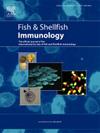Evaluation of inhibitory, immunomodulatory, survival, and growth effects of host-derived Weissella confusa on Macrobrachium rosenbergii challenged with Vibrio parahaemolyticus
IF 4.1
2区 农林科学
Q1 FISHERIES
引用次数: 0
Abstract
Macrobrachium rosenbergii is a highly valuable prawn species in aquaculture due to its current growing demand in the market. However, various bacterial diseases caused by Vibrio parahaemolyticus have been observed to induce mortality in larval, juvenile, and adult stages of M. rosenbergii. While antibiotics are commonly used to manage these diseases, they contribute to antimicrobial resistance, a global concern with serious environmental and health implications. Consequently, the scientific community is exploring host-derived beneficial microorganisms as functional feed additives, offering eco-friendly alternatives that boost shrimp and prawn immunity. The purpose of this study was to examine the effects of host-derived beneficial microorganisms from the gut of M. rosenbergii, on the inhibition, immunomodulation, survival, and growth of M. rosenbergii when exposed to V. parahaemolyticus. The result of this study showed that Weissella confusa C6, a lactic acid bacterium isolated from the gut of M. rosenbergii, significantly inhibits the growth of V. parahaemolyticus R1 as demonstrated in agar well diffusion assay and co-culture assay. Additionally, it showed immunomodulatory effects, indicated by elevated total hemocyte count (THC) and phenoloxidase (PO) activity during the bacterial challenge test. Furthermore, supplementing the diet with W. confusa led to significant improvements in M. rosenbergii, including increased survival rates, weight gain, specific growth rate, better feed conversion ratio, and reduced density of V. parahaemolyticus in the prawn's gut. Therefore, it can be considered a viable option for use as a feed supplement in prawn farming, enhancing M. rosenbergii's immune system, disease resistance, and overall health.
评估宿主产生的魏氏梭菌对受到副溶血性弧菌挑战的鲭鱼的抑制、免疫调节、存活和生长效应
由于目前市场需求量不断增长,罗氏沼虾(Macrobrachium rosenbergii)在水产养殖业中是一种非常珍贵的对虾品种。然而,由副溶血性弧菌引起的各种细菌性疾病已被观察到会导致对虾幼体、幼鱼和成鱼死亡。虽然抗生素通常用于控制这些疾病,但它们会导致抗菌药耐药性,这是一个全球关注的问题,对环境和健康都有严重影响。因此,科学界正在探索将源自宿主的有益微生物作为功能性饲料添加剂,提供可提高对虾免疫力的生态友好型替代品。本研究的目的是检测从罗氏沼虾肠道中提取的宿主有益微生物对罗氏沼虾暴露于副溶血性弧菌时的抑制、免疫调节、存活和生长的影响。这项研究的结果表明,在琼脂井扩散试验和共培养试验中,从罗氏鹅膏菌肠道中分离出来的乳酸菌魏氏菌 C6 能显著抑制副溶血性弧菌 R1 的生长。此外,它还具有免疫调节作用,在细菌挑战试验中,血细胞总数(THC)和酚氧化酶(PO)活性都有所提高。此外,在日粮中添加 W. confusa 还能显著改善罗氏沼虾的生长状况,包括提高存活率、增重、特定生长率、饲料转化率,并降低对虾肠道中副溶血性大肠杆菌的密度。因此,在对虾养殖中将其用作饲料添加剂,提高对虾的免疫系统、抗病能力和整体健康水平,是一种可行的选择。
本文章由计算机程序翻译,如有差异,请以英文原文为准。
求助全文
约1分钟内获得全文
求助全文
来源期刊

Fish & shellfish immunology
农林科学-海洋与淡水生物学
CiteScore
7.50
自引率
19.10%
发文量
750
审稿时长
68 days
期刊介绍:
Fish and Shellfish Immunology rapidly publishes high-quality, peer-refereed contributions in the expanding fields of fish and shellfish immunology. It presents studies on the basic mechanisms of both the specific and non-specific defense systems, the cells, tissues, and humoral factors involved, their dependence on environmental and intrinsic factors, response to pathogens, response to vaccination, and applied studies on the development of specific vaccines for use in the aquaculture industry.
 求助内容:
求助内容: 应助结果提醒方式:
应助结果提醒方式:


